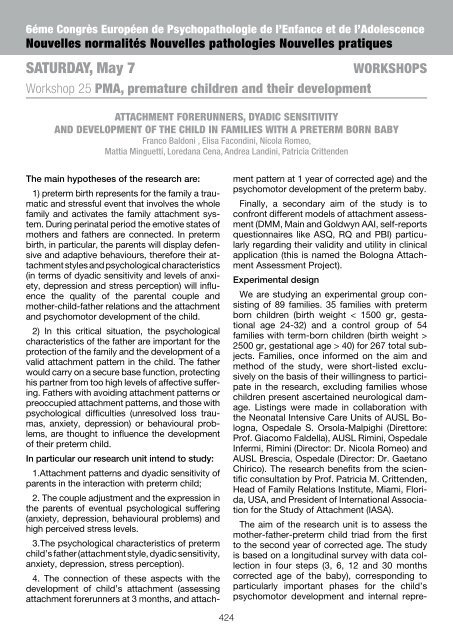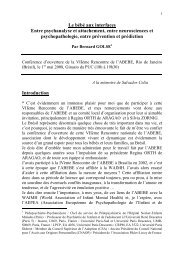Nouvelles normalités Nouvelles pathologies Nouvelles ... - Psynem
Nouvelles normalités Nouvelles pathologies Nouvelles ... - Psynem
Nouvelles normalités Nouvelles pathologies Nouvelles ... - Psynem
You also want an ePaper? Increase the reach of your titles
YUMPU automatically turns print PDFs into web optimized ePapers that Google loves.
6° 6éme Congresso Congrès Européen Europeo de di Psicopatologia Psychopathologie dell’Infanzia de l’Enfance e et dell’Adolescenza<br />
de l’Adolescence<br />
Nuove <strong>Nouvelles</strong> normalità <strong>normalités</strong> Nuove <strong>Nouvelles</strong> patologie <strong>pathologies</strong> Nuove pratiche <strong>Nouvelles</strong> pratiques<br />
SATURDAY, May 7 WORKSHOPS<br />
Workshop 25 PMA, premature children and their development<br />
ATTACHMENT FORERUNNERS, DYADIC SENSITIVITY<br />
AND DEVELOPMENT OF THE CHILD IN FAMILIES WITH A PRETERM BORN BABY<br />
Franco Baldoni , Elisa Facondini, Nicola Romeo,<br />
Mattia Minguetti, Loredana Cena, Andrea Landini, Patricia Crittenden<br />
The main hypotheses of the research are:<br />
1) preterm birth represents for the family a traumatic<br />
and stressful event that involves the whole<br />
family and activates the family attachment system.<br />
During perinatal period the emotive states of<br />
mothers and fathers are connected. In preterm<br />
birth, in particular, the parents will display defensive<br />
and adaptive behaviours, therefore their attachment<br />
styles and psychological characteristics<br />
(in terms of dyadic sensitivity and levels of anxiety,<br />
depression and stress perception) will influence<br />
the quality of the parental couple and<br />
mother-child-father relations and the attachment<br />
and psychomotor development of the child.<br />
2) In this critical situation, the psychological<br />
characteristics of the father are important for the<br />
protection of the family and the development of a<br />
valid attachment pattern in the child. The father<br />
would carry on a secure base function, protecting<br />
his partner from too high levels of affective suffering.<br />
Fathers with avoiding attachment patterns or<br />
preoccupied attachment patterns, and those with<br />
psychological difficulties (unresolved loss traumas,<br />
anxiety, depression) or behavioural problems,<br />
are thought to influence the development<br />
of their preterm child.<br />
In particular our research unit intend to study:<br />
1.Attachment patterns and dyadic sensitivity of<br />
parents in the interaction with preterm child;<br />
2. The couple adjustment and the expression in<br />
the parents of eventual psychological suffering<br />
(anxiety, depression, behavioural problems) and<br />
high perceived stress levels.<br />
3.The psychological characteristics of preterm<br />
child’s father (attachment style, dyadic sensitivity,<br />
anxiety, depression, stress perception).<br />
4. The connection of these aspects with the<br />
development of child’s attachment (assessing<br />
attachment forerunners at 3 months, and attach-<br />
424<br />
ment pattern at 1 year of corrected age) and the<br />
psychomotor development of the preterm baby.<br />
Finally, a secondary aim of the study is to<br />
confront different models of attachment assessment<br />
(DMM, Main and Goldwyn AAI, self-reports<br />
questionnaires like ASQ, RQ and PBI) particularly<br />
regarding their validity and utility in clinical<br />
application (this is named the Bologna Attachment<br />
Assessment Project).<br />
Experimental design<br />
We are studying an experimental group consisting<br />
of 89 families. 35 families with preterm<br />
born children (birth weight < 1500 gr, gestational<br />
age 24-32) and a control group of 54<br />
families with term-born children (birth weight ><br />
2500 gr, gestational age > 40) for 267 total subjects.<br />
Families, once informed on the aim and<br />
method of the study, were short-listed exclusively<br />
on the basis of their willingness to participate<br />
in the research, excluding families whose<br />
children present ascertained neurological damage.<br />
Listings were made in collaboration with<br />
the Neonatal Intensive Care Units of AUSL Bologna,<br />
Ospedale S. Orsola-Malpighi (Direttore:<br />
Prof. Giacomo Faldella), AUSL Rimini, Ospedale<br />
Infermi, Rimini (Director: Dr. Nicola Romeo) and<br />
AUSL Brescia, Ospedale (Director: Dr. Gaetano<br />
Chirico). The research benefits from the scientific<br />
consultation by Prof. Patricia M. Crittenden,<br />
Head of Family Relations Institute, Miami, Florida,<br />
USA, and President of International Association<br />
for the Study of Attachment (IASA).<br />
The aim of the research unit is to assess the<br />
mother-father-preterm child triad from the first<br />
to the second year of corrected age. The study<br />
is based on a longitudinal survey with data collection<br />
in four steps (3, 6, 12 and 30 months<br />
corrected age of the baby), corresponding to<br />
particularly important phases for the child’s<br />
psychomotor development and internal repre-



